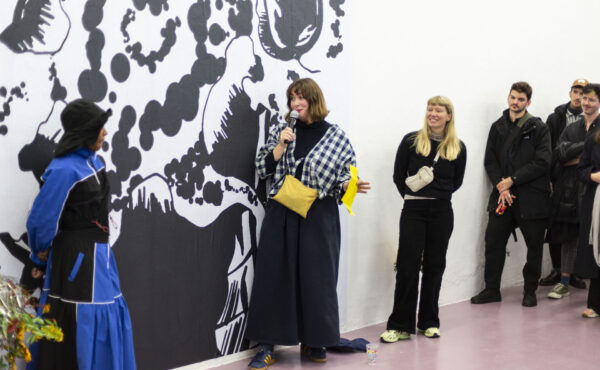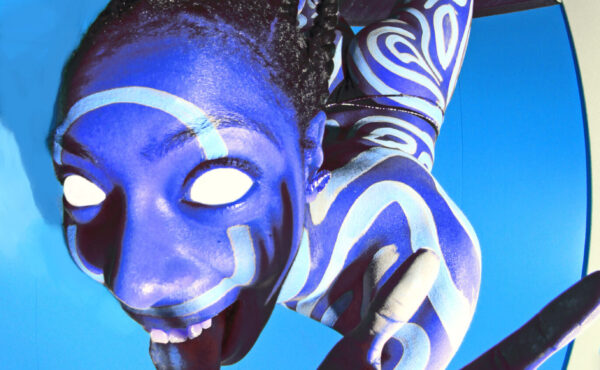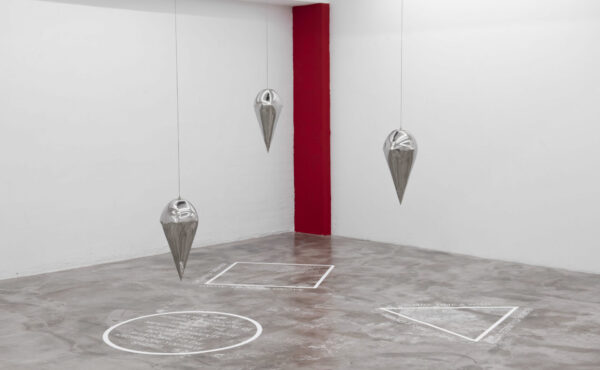
Library University Leiden, print which was used as campaing image for Books Thet Made History, Museum van Oudheden, 2022
Rethinking authority and abundance
Leading to the celebration Keti Koti, Nuraini Juliastuti asks under what conditions the meaning and value of knowledge is determined? She reflects on how archives such as libraries, museums and universities can decolonise their practices, and makes a case for the still barely discussed need for the restitution of written sources.
I Books and the production of authority
It all started with Books that made History, a small temporary exhibition at the Rijksmuseum van Oudheden in Leiden (22.6 t/m 4.9.2022). The exhibition featured selected works of various well-known and respected writers and scholars from the Netherlands and beyond, like René Descartes, Galileo Galilei, Albert Einstein en Herman Boerhaave. Each in their own way, these thinkers were connected to the strong academic and intellectual histories of Leiden. Their works were either written in Leiden, thus strongly affiliated with Leiden University, or published by one of the many different Leiden-based publishers. Rene Descartes’s Discours De La Methode (Discourse on the Method of Rightly Conducting One’s Reason and of Seeking Truth in the Science) was published by Johannes Maire in 1637, for instance. Galileo Galilei’s Discorsi e Dimostrazioni Matematiche, intorno a due nuove scienze (The Discourses and Mathematical Demonstrations Relating to Two New Sciences) was published by Abraham & Bonaventura Elzevier in 1638. I was already familiar with some names of the publishers of the books in the exhibition such as Brill and Elsevier, which have survived and continue publishing academic works but I was also introduced to some new publishers too.
The exhibition also showed the Grundlage der Allgemeinen Relativitätstheorie (The Foundation of the General Theory of Relativity) (1916) by Albert Einstein, who was a professor by special appointment at Leiden University and whose presence in the city is still very visible.Another fascinating addition was Herman Boerhaave’s Institutiones Medicae, which was published by Johannes van der Linden in 1707. Boerhaave was an important figure in modern medicine and a botanist, and former Rector Magnificus of Leiden University. As a whole, the exhibition demonstrating the city’s long history of academia, set on the strong foundation of the university and its publishing tradition.
The exhibition prompted many questions about the role of books in the production of authority while also serving as a means of performing an authoritative way of how knowledge is produced and conserved. It made me wonder, what kinds of circumstances define the meaning of knowledge? The exhibition suggests the dominance of paper-based collections define the meaning of archives and knowledge. It provides insights into the institutionalisation of books as the mainstay of the knowledge system. In a time of ubiquitous and overwhelming digitality, this is an important point.
During my visit, I could not help feeling that these books appeared at odds with the permanent collections in the museum. The museum’s collections consist of the usual classics: various objects and artefacts from Ancient civilisations such as Egypt, Nubia, Greece, the Roman Empire, early civilisations in the Middle East, and the Netherlands (from prehistory to Middle Ages). But if I interpret books as ‘classics’, one of a kind, or rare objects, their existence in Rijksmuseum van Oudheden at the time becomes somewhat understandable. The books in the exhibition were mainly written in Latin or various European languages such as Italian, German or Dutch. This speaks to the establishment of these languages as the language of the experts in science and knowledge distribution. These books were put in the vitrines, freed from the visitors’ perusal and became untouchables. The collection of the museum defines what can be regarded as ‘classics’, knowledge and civilisation. Other knowledge that is produced outside of the known areas and categories of classics are regarded as non-knowledge or a different kind of knowledge. To think about this categorisation is important because it is the first step to paying respect to texts and manuscripts written by various indigenous communities containing creation stories, literary works, and sciences such as medicine, astronomy, botany and maritime law – and to regarding these on their own terms.

Hugo Grotius, Mare Liberum, which was paid by the V-O-C the legitimize its trade policy

Leids University Fund, based in Snouck Hurgronje House at Rapenburg in Leiden
In the exhibition, several books grabbed my attention in particular: Bilder Aus Mekka by Snouck Hurgronje (Brill, 1889), Hugo Grotius (Hugo de Groot), ; Mare Liberum (The Freedom of the Seas) (Elsevier, 1609); Hoesein Djajadiningrat, Kritische Beschouwing van de Sadjarah Bantĕn (Critical Consideration of the Banten History, Joh, 1913); Anton de Kom’s Wij Slaven van Suriname (We Slaves of Suriname) (1934, a stencilled reprint was first published in Leiden in 1963). Each in their own way, these books connect to my previous questions about the relations between the definition of knowledge and power balances.
Take Hurgronje’s book, for example. The book contains twenty photographic prints showing various scenes during hajj pilgrim in Mecca. Hurgronje was a notable Dutch scholar and a professor of Arabic at Leiden University, whose area of expertise was the Islam. Although the caption in the exhibition accurately explained what the book was about, it did not describe the historical implications that came with the gathering and cataloguing of the information inside it. During the Dutch colonisation, Hurgronje served as an advisor to the Netherlands East Indies’ government, offering consultations to general J.B. Van Heutsz. Hurgronje used his knowledge on Islam and moslem cultural traditions to guide and assist the colonial government in conquering the Aceh people in the Aceh War (1873-1910). Hurgronje’s house at Rapenburg 61 was inherited by Leiden University and is now used as the office for the Leiden University Fund. Ironically, the house is located next to the building that today houses the International Institute for Asian Studies.
Another example is the caption of Mare Liberum by Hugo Grotius, which describes this book as follows: ‘the jurist Hugo Grotius argues that the seas, like the skies, cannot be anyone’s (or any nation’s) property. The book was commissioned by the Dutch East India Company (VOC), founded in 1602, which advanced this argument to circumvent the trade monopolies of Spain and Portugal that had received the Pope’s approval. The principles are still very much alive today, as is clear from contemporary debates about issues such as fishing rights and drilling for oil at sea.’ Although the caption explained the connection between Grotius and the VOC, it did not make explicit how his role as an intellectual paved the way for free trade and colonialism. It seems like a missed opportunity not to connect these books with contemporary power structures and decolonial thinking, an approach that would involve ethical action to problematize wealth and to engage in discussions regarding power imbalances and restitution.
II Access, abundance, dispersion
To some extent, I admit that I have been lucky enough to be surrounded by abundance. I have completed parts of my education at various education institutions in the Netherlands and have started building a career here. It might sound weird to clarify this but this position has drastically shaped my perspectives on the politics of knowledge and access. This trajectory of education and employment has granted me access to university libraries where I could consult numerous journal articles, e-books, and printed materials, which I would not be able to access otherwise.
The functions of libraries and museums as a means of education have been made possible through the abundance of their resources. They evolve to be the machines that authorise knowledge and that categorise certain matters as knowledge, and others as ‘different’ or non-knowledge. Needless to say, the books shown in the exhibition are all part of the collection of the library of Leiden University. Abundance is not a matter to be taken for granted. To amass abundance and to have total control over it, is one of the prerequisites to maintain institutional knowledge power. Therefore to live surrounded by abundance means to always be ready to connect the wealth with the existing gaps.
I was born and raised in a context where one often has to illegally pirate and copy certain reading materials in order to access them. Admittedly, I was used to these acts, or shall we say, I have nurtured a more nuanced view of these practices. I would not dismiss piracy as a mere copyright infringement. What should one do if pirated or copied materials emerged as the only options available to obtain knowledge? It is too convenient to think of downloading a book, which is in most cases dedicated to writing, reading, and expanding the imagination, as stealing.
It is also important to realise that (colonial) museums, the kinds of museums which still surround the universities of Europe, are founded on colonial objects derived from long-term and organised extraction. The resourcefulness of the university is often implicated in colonial histories. We should not turn a blind eye to these matters. The Bushuis, or the Oost Indisch Huis, in Amsterdam was the headquarters of the Verenigde Oost Indische Compagnie. In this building, there is a VOC Zaal, the room which was used as a meeting place of the Heren Zeventien, the board members of the VOC. Today, the building functions as an important site of the Faculty of Humanities of the University of Amsterdam. My postdoc employment was affiliated with the faculty and I used to have a shared office there. When I was a masters student of Contemporary Asian Studies at the UvA, the Bushuis was where the library and the study centre were located.
How to take a decolonising perspective on intellectual property? The introduction of the decolonial perspective in museums and their collections has resulted in the plea for restitution as the most plausible scenario to fix the problem. However, as much of the discussion around restitution is focused on objects and artefacts, it rarely touches on books and other conventional printed matter. In order to start thinking about this, I start with the exhibition and propose to divide the books presented there in two categories:‘friends to think together with’ and ‘figures to be held accountable.’ For example, Anton de Kom’s Wij Slaven van Suriname (We Slaves of Surinam) would fall under the first category. This is the kind of book which is in tune with the pressing matters, both at the time of writing and today. The exhibited book by Snouck Hurgronje, Bilder Aus Mekka (Brill, 1889), would fall under the second category. All books which fall under the second category need re-reading and reinterpretation. While Hurgronje’s intellectual works are made visible in the exhibition and the library, the public should also be introduced to the stories of Cut Nya Dien, Cut Nya Meutia, Teuku Umar, Panglima Polim, and the Aceh people themselves, who fought tirelessly until they were forced to surrender to Hurgronje’s intellectual trick. Their independent stories were preceded by the story of Laksamana Malahayati (also spelled Keumalahayati), the admiral who had fought against the Dutch along with her Inong Balee troop of widows. In 1859, Malahayati defeated and killed Cornelis de Houtman, the Dutch merchant seaman who led the Dutch East Indies’ first expedition to the East Indies.

The Bushuis in a 17th century painting. The V-O-C used it as place for meetings and its financial administration. The house has been replaced by a new building in the 19th century, which now is used by the University of Amsterdam
Restitution is a state project, with a massive bureaucracy. Just like any other state-to-state cooperation, it always takes a long time to materialise it into real action. In the meantime, museums and other art and cultural institutions will keep organising exhibitions in accordance with their own perspectives and mindset. Many Indonesian researchers, writers, and thinkers are dreaming of travelling to the Netherlands to be able to access various materials about Indonesia: artefacts, photographs, books, pamphlets, maps and all sorts of intellectual collectibles. In 2011, when I started my PhD in Leiden University, I met a large group of Indonesians (most of them were lecturers working for various universities) who came for a short fellowship in KITLV and Leiden University. The aims of their fellowships were to write research proposals based on the abundance of the institutions. To write comprehensive Indonesian histories, Indonesians need to be travellers. And in this context, we are always positioned as borrowers, or visiting fellows at best. To take ownership of what is lost is crucial. Along with this thinking is the development of innovative mechanisms to open up the resources of knowledge and bridging formal and informal institutions. The general public, of which the Indonesian researchers I met are merely an example, will have access to these resources without having to comply with various application requirements set by the host institutions which own the resources. If this would be the case in the future, many researchers won’t have to obtain the means to travel to the Netherlands, and would not be hindered in furthering their research. It would be a first step towards penetrating the wealth of the university and to make it porous.
DEZE TEKST IS EERDER GEPUBLICEERD IN METROPOLIS M NUMMER 1 2023 NAVIGATIE. STEUN METROPOLIS M, NEEM EEN ABONNEMENT. ALS JE NU EEN JAARABONNEMENT AFSLUIT STUREN WE JE NIEUWSTE NUMMER GRATIS TOE
Nuraini Juliastuti


















